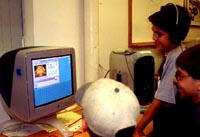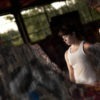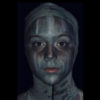
Company/Organization Profiles | Film School & Education | Vermont
Demystifying Media for Youth
Written by Amy Souza | Posted by: Anonymous
Tell a kid he’s going to spend two weeks in August deconstructing media and you’ll probably get a puzzled look, if not an outright groan. But tell her she gets to make her own movie too and watch her jump.
Every year, scores of American children head to summer camp. Last summer, 26 kids in Colchester, Vermont spent two weeks at Club Media–day camp that combines hands-on production techniques with classroom teaching about media literacy.
Suzanne DeBrosse, one of Club Media’s founders and a former middle school teacher, says the goal is to teach children to think critically about the media they encounter every day of their lives.
The idea for Club Media grew out of a serendipitous meeting two years ago at Babson College’s Felton Media Literacy Scholars Program. That’s where DeBrosse met her three co-founders: Amy Damico, who teaches communication at Endicott College in Beverly; Brian Farmer, who directs media literacy education for The Children’s Media Project in Poughkeepsie, NY; and Diane Samples, who founded and directs Media Knowledge, a nonprofit in New Fairfield, CT.
"We stayed in touch and started talking about a camp, emailing ideas back and forth," says DeBrosse.
The four founders were familiar with production camps around the country, but none, as far as they knew, taught media literacy. It’s this cerebral aspect that makes Club Media stand out.
The media is a prevalent force in our society. Even children who grow up in one of the rare households without a TV are not outside the media’s reach. Images in magazines, ads on the radio, even news in newspapers affect children. And though kids may consider themselves media savvy, they probably don’t know that certain camera angles convey power or that magazine photos of Cindy Crawford are digitally manipulated. That’s the kind of stuff they learn at Club Media.
The camp was held on the campus of St. Michael’s College, where DeBrosse now teaches media literacy to educators. Every morning, campers headed to the classroom for two 90-minute seminars. In just two weeks, DeBrosse and the others touched upon nearly every aspect of the media: film, advertising, digital techniques, animation, TV, commercials, music, magazine publishing, media violence, tobacco and alcohol, news and journalism, the Internet, radio, and even food styling. DeBrosse says now they may have tried to cover too much in too short a time. Although the kids learned quite a bit, she feels they could learn so much more by going in depth on one topic like news, TV, or advertising.
Campers responded particularly well to two Club Media highlights: the daily secret and the daily appreciation. The daily appreciation introduced campers to a piece of media the founders admire, like the opening sequence of Citizen Kane or Japanese animation. Daily secrets taught kids something they didn’t know about media. For instance, they learned the secret behind a TV ad for a flying GI Joe that hung in the air on TV but quickly fell to the ground in real life. What they learned was that the producers rigged a battery into the toy to make it stay in the air longer. When the campers found that out, they said, "Hey, that’s not fair!"
"The kids did love finding out about all of the tricks of the trade and production techniques," says DeBrosse. "It leads to a new level of their relationship with the media."
In the afternoon, campers were split up into groups of three or four and learned about production, clearly the highlight for many of them. The leaders took the groups through every stage of production: idea generation & brainstorming, storyboarding, writing, shooting, and editing. For many of the kids, this was their first experience creating something as a group, and ground rules had to be set. The rules for brainstorming, for instance, included not making fun of someone else’s ideas.
Campers had three options of what to make: a commercial, a PSA, or a mini-movie. Three girls made a PSA about body image; another group made a wacky commercial for a rubber chicken; and another group made a fake newscast, complete with in-your-face interviews of disaster victims and an arrest caught on tape. One group of boys even went the action-adventure route and created a fast-paced short that had surprising continuity and drama.
"They just started talking about what was important to them and the ideas started gelling." DeBrosse shakes her head and laughs a little when she says she doesn’t know how the kids came up with such great ideas. "Each group was so different," she adds.
All of the Club Media productions aired on Vermont’s Regional Educational Television Network (RETN).
Because media is such a huge part of American life, one might think media literacy would be part of the national education curriculum standards. It’s not in America. But, says DeBrosse,
media literacy has been on the curriculum in Australia, England, and Canada for 25 years. That shouldn’t come as a surprise, really.
"Each country recognized the assault on their culture by American media and wanted to do something about it," says DeBrosse. That something was to educate consumers.
Though no national standard exists in this country, 20 or more states have included media literacy in their education guidelines. In Vermont, these standards spell out the media skills that students should have by the time they graduate from high school–they should be able to think critically about, interpret, and evaluate the media messages they encounter, as well as be able to design and create media messages themselves.
DeBrosse says the need for media education becomes more recognized each year. However, until it becomes a regular part of all students’ school days, there’s Club Media. The founders had their own brainstorming session recently and may put together a Club Media workbook that other camps or schools can use to teach media literacy.
Who knows what could happen if all American kids became media literate? As DeBrosse points out, today’s children are tomorrow’s media makers; the more they learn to appreciate both the power and the art of media, the better communicators they’ll become.
Club Media will be held again next year in Vermont, as well as in Westchester County, NY, and possibly Fairfield County, CT. For more information, contact Suzanne DeBrosse at jsdebro@attglobal.net or 802-860-4779.











